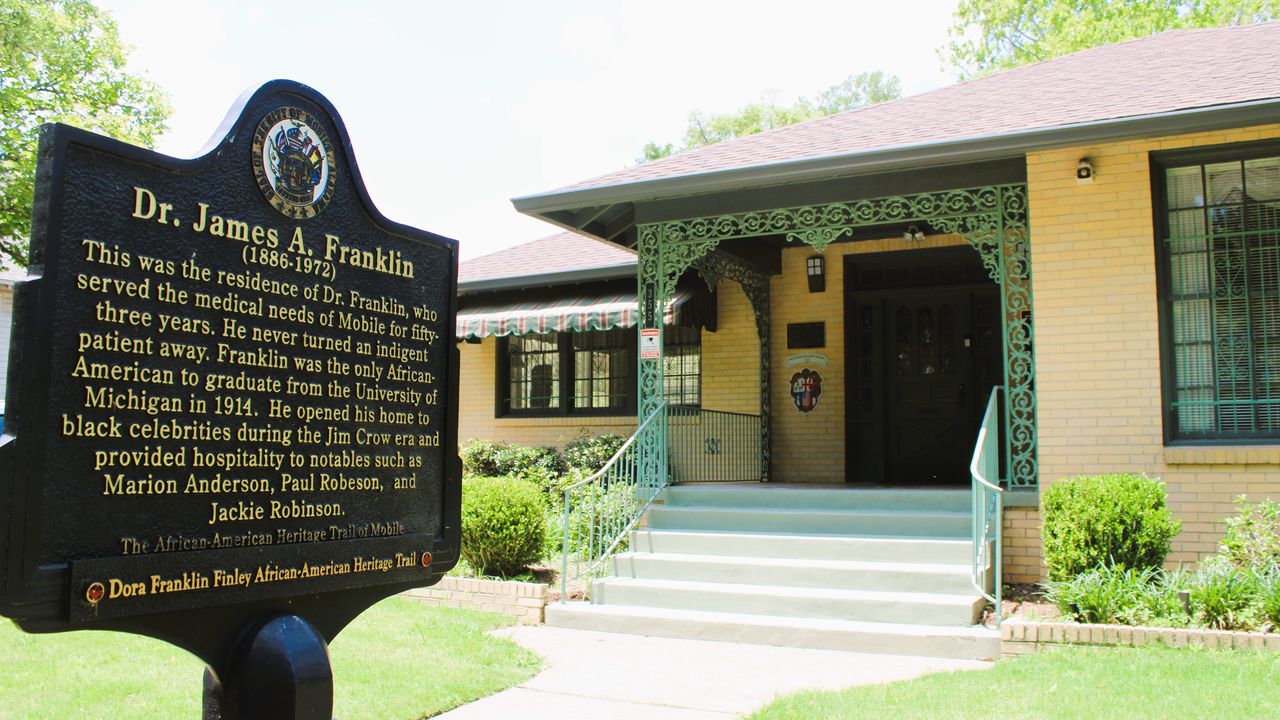Home of Dr. Franklin, Mobileâs pioneering Black caregiver, to be opened
“It’s so important that people realize how history unites, as opposed to divides,” said Karlos Finley. “What’s important is how people interacted and how they created this wonderful tapestry that we call Mobile. And the United States of America.”
The Dora Franklin Finley African American Heritage Trail, an organization of which Finley is president, is about to throw open a home that played a unique role in that history. And that opening comes amid a full weekend of celebrations that include an award ceremony honoring The Excelsior Band and an Underground Railroad Bike Tour.
At the center of it all is the spacious, elegant home at 355 N. Ann St., which once was home and office of Dr. James Alexander Franklin. It also served as a safe haven for high-profile Black guests visiting Mobile during the Jim Crow era.
An event on Saturday, May 20, will offer a “preview” of the house, which has been refurbished and equipped to serve as both a monument to Dr. Franklin’s accomplishments and legacy and as a contemporary events space. Karlos Finley prefers to call it a gallery rather than a museum, but either way it provides a sense of a man who exemplified Black achievement in the Deep South of the early 20th century.
Dr. Franklin, who had been educated at the University of Michigan prior to service in World War I, was near penniless when he arrived in Plateau in 1919 after leaving Evergreen to avoid a threat of lynching. He earned a reputation for generosity among those who couldn’t afford fees, but also steadily developed his portfolio of business and residential properties. Among the exhibits in the home is a 1954 Ebony Magazine profile describing him as “The South’s Richest Negro Doctor.” In it, he’s shown in front of the home with his second wife, Marguerite. He’s described as “a self-effacing man who disdains pomp and show” who accrued wealth because he “lived quietly, invested his money in real estate and opened a drug store.”
But starting in the early 1930s, he made the same home a refuge. John LeFlore invited Oscar De Priest of Chicago, the first African American to be elected to Congress after Reconstruction, to speak in Mobile. When Klan threatened retaliation against anyone who helped De Priest’s visit, Finley and his first wife, Dora, opened their home to him. Karlos Finley credits his grandmother with the decision to station armed guards on the roof and outside.
Photos shows some of the other celebrities who stayed in the home: Dorothy Dandridge, Paul Robeson, Marian Anderson. “This became the respite for famous African Americans to stay during the Jim Crow South,” Karlos Finley said.
The house, rebuilt to its current outlines in 1950, bears a recently bestowed “banner and shield” of historic preservation. Its furnishings and fixtures are a mix of original and period pieces. The many photographs range from family memorabilia to images from the University of South Alabama archives.
With multiple large rooms and a conference room, a courtyard, modern internet connectivity and a kitchen suited to the needs of caterers, Finley said the home is suited for use as an event space, from corporate retreats to luncheons to weddings.
For Karlos Finley and other descendants of Dr. Franklin, it’s a very personal space. “This is where we came for every Easter, every Christmas, every holiday dinner,” he said. “The grandchildren of his 10 children all gathered in this house and we celebrated.”
But it’s once again ready to play a role in public life, he said, providing a tangible connection to a vibrant past.
This weekend’s schedule of events:
Friday, May 19: The Griot Award Gala. Karlos Finley’s sister, Dora Franklin Finley, was the founder of the heritage trail that bears her name. After her death in 2012, Karlos Finley said, the Griot Awards were created to honor her memory. The annual awards ceremony “celebrates individuals or entities who personify the spirit of the Griot,” he said. “The Griot, in African culture, is the keeper of the history. The individual who ensures that the next generation never forgets, that history is not lost. They were orators and musicians. So we honor, each year, an individual or entity who carries on that spirit.”
This year’s honoree is The Excelsior Band, the Mobile institution honored as one of the National Endowment for the Arts’ 2022 National Heritage Fellows. The gala takes place from 6 p.m. to 9 p.m. Friday, May 19, in the Atrium of Government Plaza. Tickets are $75 per person and tables are available. For tickets or full information visit www.dffaaht.org/events.
Saturday, May 20: The preview of the Historic Franklin House and Gallery runs from 2 p.m. to 5 p.m. at 355 N. Ann St. The event is free and the public is welcome. Light hors d’ouevres and refreshments will be served, and a shuttle service will run from the Franklin Primary Health Center at 1303 Dr. Martin Luther King Jr. Ave.
Sunday, May 21: An Underground Railroad Bike Tour, being held in conjunction with National Bike Month, begins at 2 p.m. at Heart of Mary School, 310 Stengstak St. Points of interest on its route, which covers six to eight miles, include Stone Street Baptist Church, Creole Fire Station No. 1, John Ragland’s Slave Market and Africatown. Tickets are $50, which includes a T-shirt, swag bag and admission to a post-ride party. For more information, visit www.dffaaht.org/events.
